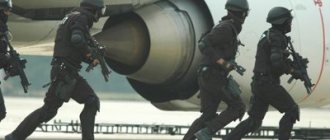ST 263 of the Criminal Code of the Russian Federation.
1. Violation of traffic safety rules and operation of railway, air, sea and inland water transport and the metro by a person who, by virtue of the work performed or position held, is obliged to comply with these rules, except for the cases provided for in Article 271.1 of this Code, as well as the refusal of the specified person to comply of their labor duties in cases where such refusal is prohibited by law, if these acts negligently entailed the infliction of grave harm to human health or the infliction of large damage, - shall be punishable by a fine in the amount of one hundred thousand to three hundred thousand rubles or in the amount of the wages or other income of the person convicted of a period of one to two years, or restriction of freedom for a term of up to four years, or forced labor for a term of up to two years with deprivation of the right to hold certain positions or engage in certain activities for a term of up to three years or without it, or arrest for a term of up to six months, or imprisonment for a term of up to two years with or without deprivation of the right to hold certain positions or engage in certain activities for a term of up to three years.
1.1. Violation of safety rules for traffic and operation of air, sea and inland water transport by a person operating a light (ultra-light) aircraft or small craft, except for the cases provided for in part one of this article and Article 271.1 of this Code, if these actions negligently entailed the infliction of grievous harm human health or causing major damage, -
shall be punishable by a fine in the amount of one hundred thousand to three hundred thousand rubles, or in the amount of the wages or other income of the convicted person for a period of one to two years, or by restriction of liberty for a term of up to four years, or by forced labor for a term of up to two years with deprivation of the right to occupy certain positions or engage in certain activities for a term of up to three years or without it, or arrest for a term of up to six months, or imprisonment for a term of up to two years with deprivation of the right to hold certain positions or engage in certain activities for a term of up to three years or without it.
1.2. Acts provided for in parts one and one.1 of this article, committed by a person in a state of intoxication, resulting through negligence in causing grievous harm to human health, -
shall be punishable by forced labor for a term of up to five years with deprivation of the right to hold certain positions or engage in certain activities for a term of up to three years, or imprisonment for a term of three to seven years with deprivation of the right to hold certain positions or engage in certain activities for a term of up to three years.
2. Acts provided for in parts one and one.1 of this article, resulting in the death of a person through negligence, -
shall be punished by forced labor for a term of up to five years or imprisonment for the same term.
2.1. Acts provided for in parts one and one.1 of this article, committed by a person in a state of intoxication, resulting in the death of a person through negligence, -
shall be punished by imprisonment for a term of five to twelve years.
3. Acts provided for in parts one and one.1 of this article, resulting in the death of two or more persons through negligence, -
shall be punishable by forced labor for a term of up to five years or imprisonment for a term of up to seven years.
4. Acts provided for in parts one and one.1 of this article, committed by a person in a state of intoxication, resulting in the death of two or more persons through negligence, -
shall be punished by imprisonment for a term of eight to fifteen years.
Note. In this article, major damage is defined as damage the amount of which exceeds one million rubles.
Commentary to Art. 263 Criminal Code
1. The subject of the crime is the types of transport specified in the article (both public or non-public vehicles themselves, and the production and technological complex of transport infrastructure that ensures the operation of the corresponding types of transport). On the concept of transport infrastructure, see the commentary to Art. 263.1 CC. Intrashop and intramine transport and infrastructure (trolleys, rails) that technologically support production processes are not the subject of a crime. Also not included in the crime are combat aircraft, warships and military auxiliary vessels, which are the subject of a number of military crimes.
2. The objective side of the crime is expressed in the form of action or inaction. Violation of traffic safety rules and transport operation is a complete or partial failure to comply with the procedures for driving and safe use of the relevant vehicles established by legal acts. Violation of traffic safety rules can be expressed in non-compliance with the route and flight altitude, driving through a prohibiting signal, failure to comply with the speed limit, etc. Refusal of a person obligated to comply with the rules of traffic safety and operation of transport to perform labor duties in cases where such refusal is prohibited by law is illegal (Article 413 of the Labor Code of the Russian Federation, Part 1 of Article 52 of the Air Code of the Russian Federation, Part 2 of Art. 26 of the Federal Law of January 10, 2003 N 17-FZ “On Railway Transport in the Russian Federation”, Part 2 of Article 17 of the Federal Law of August 25, 1995 N 153-FZ “On Federal Railway Transport”) failure by a person job responsibilities arising from an employment contract (job descriptions), not directly related to violation of traffic safety rules and transport operation.
3. The crime is considered completed from the moment socially dangerous consequences occur due to negligence: grave harm to human health or major damage (Part 1) (according to the note to this article, this is damage the amount of which exceeds 1 million rubles); death of a person (part 2); death of two or more persons (Part 3). In this case, it is necessary to establish a cause-and-effect relationship between the actions and the socially dangerous consequences that have occurred, which is often complex in nature. In the absence of these consequences, acts may be qualified according to a number of provisions of Chapter. 11 Code of Administrative Offenses of the Russian Federation.
4. The subjective side of the crime is characterized by carelessness in the form of frivolity or negligence. The refusal of a person obliged to comply with the rules of traffic safety and operation of transport to perform labor duties is committed by the person consciously, but the crime will be careless due to the mental attitude to the consequences.
5. Special subject: a person directly driving a vehicle (driver, pilot, ship captain, boat helmsman, etc.), as well as a person obliged, by virtue of the work performed or position held, to comply with traffic safety rules or operation of railway, air or water transport (for example, dispatcher, mechanic, technologist, flight director, etc.).
Public danger
The act provided for in Art. 263 of the Criminal Code of the Russian Federation, encroaches on the rules of operation and movement of all types of transport, with the exception of cars, as well as the subway. Additional objects are the life and health of the population, environmental safety and property.
Safety during operation and movement should be considered the state of security of the process of movement and use of the types of transport specified in the standard. Compliance with the rules is aimed at preventing the likelihood of incidents and their consequences, expressed in the form of harm to life, health, damage to nature, and property.
Second commentary to Art. 263 of the Criminal Code of the Russian Federation
1. Rail transport should be understood as rail transport, as well as access roads of industrial and other enterprises, narrow-gauge railways for special purposes.
Air transport is all civil aviation and civil aeronautics: airplanes, helicopters, gliders, airships, balloons, etc. The departmental affiliation of the aircraft does not matter.
Maritime and inland water transport include all self-propelled vessels, regardless of their ownership, subject to registration with basin ship inspections or sea trade ports.
Metropolitan, metro (metropolitan railway) is a rail type of public transport powered by electric traction, the routes of which are laid separately from the streets, mostly underground.
2. The subject of the crime provided for in Part 11 differs significantly in legislative definition and characteristics from the subject of the crime specified in Part 1 of the commented article. In Part 1 of Art. 263 talks about transport, i.e. complex, which also includes vehicles, whereas in Part 11 we are talking about a vehicle, and a certain type: light (ultra-light) aircraft and small craft.
An aircraft whose maximum take-off weight is less than 5,700 kg is considered light, including a helicopter whose maximum take-off weight is less than 3,100 kg; ultra-light - an aircraft whose maximum take-off weight is no more than 495 kg, excluding the weight of aviation rescue equipment (Article 32 of the Air Code of the Russian Federation).
According to Art. 3 of the Code of Inland Water Transport of the Russian Federation, a vessel is considered small if its length does not exceed 20 m and the total number of people on board should not exceed 12 people. A similar characteristic of a small vessel is given in Art. 7 of the Merchant Shipping Code of the Russian Federation.
The technical regulations “On the safety of small vessels” limit the range of these vessels, making an exception based on their functional purpose. These do not include vessels built or equipped for fishing, transportation of goods, passengers, towing, searching, exploration and extraction of minerals, construction, track, hydraulic and other similar work, pilotage and icebreaking, as well as for carrying out protection measures water bodies from pollution and clogging.
3. In Part 11 of Art. 263 of the Criminal Code does not specify the legal status of small vessels, although according to the law there are two types: small vessels subject to state registration, and small vessels not subject to state registration. In accordance with clause 1.1 of Art. 33 of the Merchant Shipping Code of the Russian Federation, the latter include:
1) boats and other floating equipment that are accessories of the ship;
2) vessels weighing up to 200 kg inclusive and engine power (if installed) up to 8 kW inclusive;
3) sports sailing vessels, the length of which should not exceed 9 m, which do not have engines and which are not equipped with rest areas;
4) undecked non-self-propelled vessels, the length of which should not exceed 12 m.
A similar list is contained in clause 1.1 of Art. 16 of the Code of Inland Water Transport of the Russian Federation.
4. The criminal law does not say what kind of small vessel we are talking about, so it can be assumed that any of them, both subject and not subject to state registration, can be attributed to the subject of the crime in question.
5. The article under comment provides for three independent elements of crime. The first is characterized by a violation of traffic safety rules and operation of these types of transport, the second - a violation of traffic safety rules and operation of air, sea and inland water transport by a person operating a light (ultra-light) aircraft or small craft (due to direct instructions in the law, cases are not covered, specified in Part 1 of the same article and Article 271.1 of the Criminal Code); the third - the refusal of a person, by virtue of the work performed or position held, to comply with the specified rules, from performing duties in the event that such refusal is prohibited by law.
6. The disposition of the norm under consideration is blanket. It refers to a violation of special traffic safety rules or transport operation. For each case it must be precisely established: a) what rule was violated and what exactly the violation was; b) whether the transport worker had a duty to comply with these rules.
7. According to Art. 413 of the Labor Code of the Russian Federation, strikes are prohibited in aviation, railway and water transport; refusal to perform labor duties used to resolve an individual or collective dispute is considered illegal.
Article 20.26 of the Code of Administrative Offenses of the Russian Federation provides for liability for “unauthorized termination of work or abandonment of a place of work as a means of resolving a collective or individual dispute by a person ensuring the safety of the relevant type of activity for the population, if such actions (inaction) are prohibited by federal law.” The circle of these persons can be determined by departmental regulations that disclose the job functions or official responsibilities of a particular transport employee.
This administrative offense differs from the crime in question in the construction of its elements: the tort is constructed as a formal one, and is considered completed from the moment the act is committed; crime - according to the material type, in order to recognize it as completed, the occurrence of the consequences specified in the law is required.
8. The content of grave harm to human health is disclosed in Art. 111 of the Criminal Code.
Major damage is considered to be damage whose amount exceeds 1 million rubles.
9. Between the act and the resulting consequences must be established
causation.
10. The subjective side is characterized by a careless form of guilt.
11. The subject of the crime depends on the nature of the act committed. Under Part 1 of the commented article, a person is liable who, by virtue of the work performed or position held, is obliged to comply with the rules of traffic safety or operation of railway, air or water transport (special subject); under Part 11 - a person who, on the right of private ownership, owns and (or) operates a light (ultra-light) aircraft or small watercraft (common subject).
12. Criminal liability is differentiated depending on two circumstances: the type and severity of the consequences and the state of intoxication.
Item
It is transport. In Art. 263 of the Criminal Code lists railway transport as the main types of vehicles. This category includes freight and passenger cars, locomotives, rolling stock and other trains intended for transportation and operation of railway infrastructure.
Air transport includes helicopters, airplanes, and other devices and equipment that are used to travel by air.
Maritime transport includes submarines and surface ships. Inland water vehicles are vessels intended for navigation, including mixed types.
The metro is the name given to the rolling stock that is used for underground passenger transportation.
Denial of Compliance
In the first part of Art. 263 of the Criminal Code establishes liability not only for failure to comply with the rules, but also for deliberate refusal to comply with them in cases where it is prohibited by law. In this case, we are talking about the unlawful performance of official duties enshrined in the employment agreement or in additions to it (job description, for example).
The refusal is not directly related to violations of the rules, but falls under Art. 263 of the Criminal Code, if it creates a threat of dangerous consequences. For example, employees went on strike, thereby creating a threat to the security and defense of the country, and the life/health of the population.




